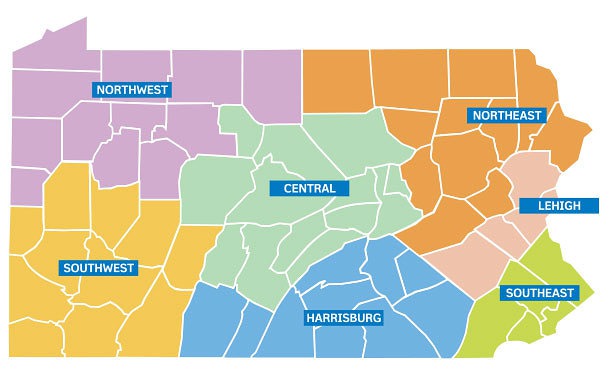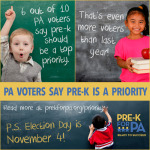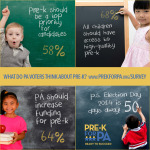MAPS & DATA
Pre-k in Your County
To learn more about the state of pre-k in your county, click on an individual county in the map below. Click on the STATEWIDE tab above to download a summary of pre-k in Pennsylvania. Citations for the data are listed under the NOTES tab.
Sources
2023-24 Pre-K for PA Data Sources and Methodology
High-quality pre-k includes: an unduplicated count of PA Pre-K Counts, Head Start Supplemental Assistance Program, and Keystone STARS 3 and 4 enrollments; Head Start; public school pre-k; accredited or PDE licensed nursery school; and providers accredited by the National Association for the Education of Young Children, National Association for Family Child Care, National Early Childhood Program Accreditation, and Council On Accreditation.
Publicly funded, high-quality pre-k includes: the unduplicated count of PA Pre-K Counts, Head Start Supplemental Assistance Program and Child Care Works enrollments in Keystone STARS 3 and 4; Head Start; and public school pre-k.
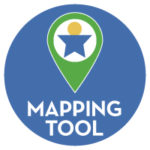 PA Partnerships for Children Pre-K Data
PA Partnerships for Children Pre-K Data
This interactive review at the Pennsylvania House, Senate and school district levels includes local data on children served, unmet need, the number of high-quality providers, current capacity and much more. Not sure where your legislative districts or school district are on the maps? No problem. Use the convenient search functionality on each map to look up your legislators or school district.
The link of the sources and methodology: 2023-24 Pre-K for PA Data Sources and Methodology
The Pre-K for PA campaign draws its strength in part from the deep research experience of our founding coalition organizations. The reports below were funded, researched, and compiled by Pre-K coalition partners. Although they are not properly credited to the Pre-K for PA campaign, they underscore the common critical conclusion that when all children have access to high-quality pre-k, opportunities expand, our schools improve, and Pennsylvania grows stronger.
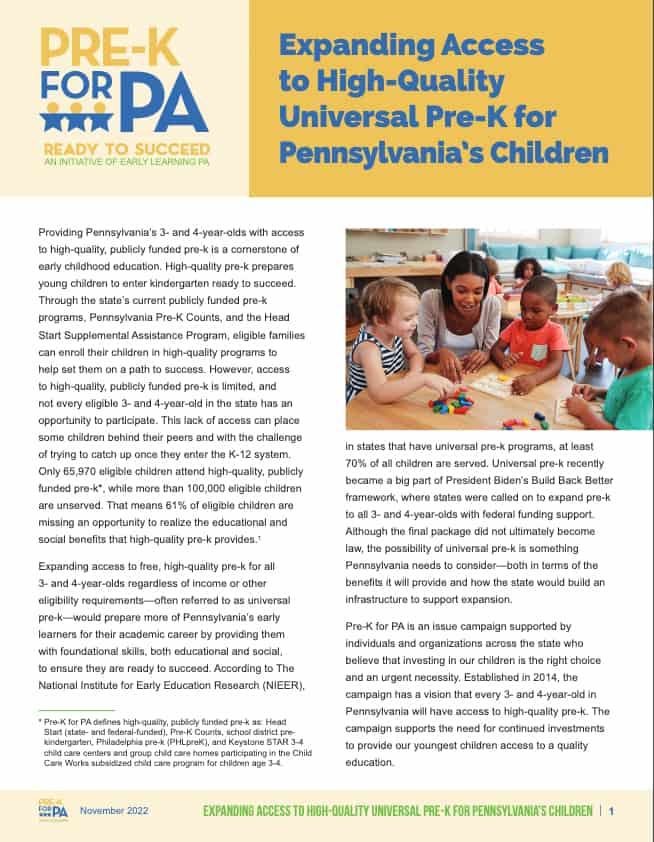 | Expanding Access to High-Quality Universal Pre-K for Pennsylvania's Children November 2022 |
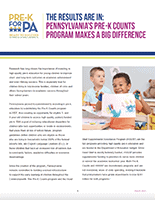 | Pre-K Counts Program Report April 2022 |
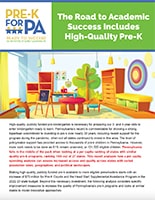 | PPC Pre-K State Comparison Report April 2022 |
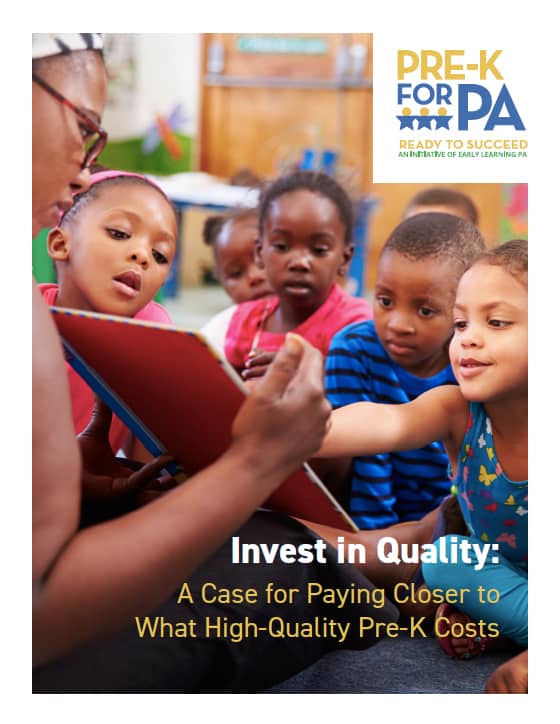 | Invest in Quality: A Case for Paying Closer to What High-Quality Pre-k Costs March 2021 Pennsylvania ranks 19 out of 28 in per capita investments of pre-k programs. Pre-k rates have not kept pace with inflation. Investing in quality through rate adjustments ensures pre-k programs can maintain high-quality and safe early learning experiences for children and families. |
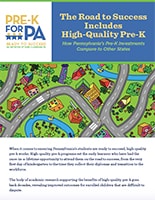 | The Road to Success Includes High-Quality Pre-K January 2020 States with similar political compositions and quality standards are making stronger per capita investments, putting their early learners on the road to success in school and in life at a faster pace than Pennsylvania. PA ranks 19th out of the 28 states that also publicly fund high-quality pre-kindergarten programs with similar quality standards, remaining nearly stagnant since the first state comparison report was released in 2017. |
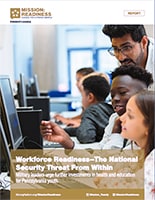 | Workforce Readiness - The National Security Threat from Within November 2019 While external threats to America’s national security are well-covered by headlines, few recognize the threat from within – the readiness of America’s youth. Retired generals and admirals call for continued investment in high-quality early care and education programs as “pipeline” investments in workforce (and military) readiness. |
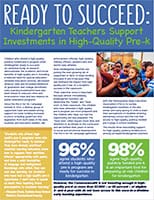 | Ready to Succeed: Kindergarten Teachers Support Investments in High-Quality Pre-k May 2019 The results of this kindergarten teacher survey show resounding support for high-quality pre-k, with 96% of elementary school teachers agreeing that students who attend a high-quality pre-k program are ready for success in kindergarten, and 98% agreeing that high-quality, publicly funded pre-k is an important tool for preparing at-risk children for kindergarten. |
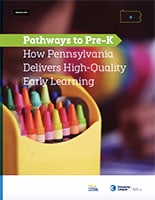 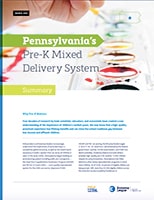 | Pathways to Pre-K: How Pennsylvania Delivers High-Quality Early Learning March 2019 Despite its early innovations, Pennsylvania has fallen behind as other states expanded their programs to reach more children. As of 2018, 44 percent of eligible children are being served. Still, more than 97,700 eligible children across the state lack access to publicly funded pre-k. |
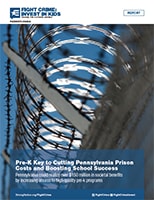 | Pre-K Key to Cutting Pennsylvania Prison Costs and Boosting School Success May 2018 PA's prisons are full of people serving time for serious and costly crimes. High school dropouts are more likely to end up in prison. But it doesn't have to be that way: Providing at-risk kids with high-quality early learning programs can reduce crime and the resulting costs, other expenditures, and long-term negative impacts on society. |
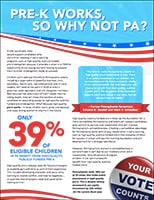 | Pre-K Works, So Why Not PA? February 2018 Pennsylvania ranks 18th out of 30 states that make public investments in high-quality pre-k. This is despite having increased its per capita investment by $30 million for the current fiscal year. |
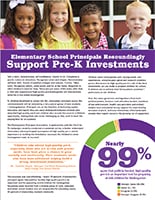 | Elementary School Principals Resoundingly Support Pre-K Investments September 2017 Elementary School Principals Resoundingly Support Pre-K Investments details findings of a recent statewide survey of elementary school principals to better understand their perception of high-quality pre-k and its importance in building the foundation necessary for children to enter kindergarten ready to succeed. Nearly 99 percent agree that publicly funded, high-quality pre-k is an important tool for preparing children for kindergarten, particularly those at risk. Sources and Citations |
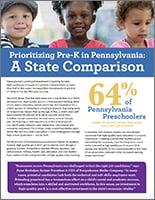 | Prioritizing Pre-K in Pennsylvania: A State Comparison May 2017 Pennsylvania Partnerships for Children (PPC) released a report that commends Pennsylvania for making increased state investments in publicly funded, high-quality pre-k but highlighting that the commonwealth is lagging behind many other states, including economic competitors, in its per capita investment. |
Voters for Pre-K
Pre-K for PA hired a bi-partisan polling team to conduct two polls among PA voters in the fall of 2013 and 2014. The results? There is strong voter support to ensure all children can access high-quality pre-k. Click below to download the Lake & Bellwether polling results for both years.
Pre-K: Additional Resources

Other Reports and Resources on Pre-Kindergarten
Here we’ve assembled a robust list of the most significant data and research on pre-kindergarten. Wherever possible, we provide the most recent reports available. Included are important benchmark studies, research specific to Pennsylvania, reports from other states, and issue-focused studies such as financing pre-k and fade out.
Impact of Publicly-Funded Pre-k in PA
Impact of Publicly-Funded Pre-k in PA
Pre-K Counts in Pennsylvania for Youngsters’ Early School Success (Early Childhood Partnerships, 2009)
- Researchers analyzed the Pre-K Counts program in 21 school districts within Pennsylvania and found significant academic and behavioral improvements for at-risk children.
Children’s Progress Update: Pennsylvania Pre-K Counts (PA Department of Education, 2012-13)
- In the state’s most recent report, children participating in Pre-K Counts showed significant academic, emotional, and social development.
Making the Business Case in PA
Making the Business Case in PA
Strengthening Pennsylvania Business through Investments in Pre-Kindergarten (ReadyNation, 2014)
- Analysis conducted by ReadyNation reveals the potential short-term and long-term economic gains for Pennsylvania resulting from investments in high-quality pre-k.
Investment in Pennsylvania’s Early Childhood Programs Payoff Now and Later (The Pew Charitable Trusts, 2011)
- The Pew Charitable Trusts presents a report on the short and long-term academic and economic impacts of high-quality early education programs for Pennsylvania.
The Military Gets It: High-quality Pre-Kindergarten Is Crucial for Youth Readiness and a Centerpiece of the Military’s Child Development System (Mission: Readiness Military Leaders for Kids, 2014)
- This report describes the military’s program to provide high quality pre-k services to families while also examining high quality pre-k programs in other states, including Pennsylvania, that show gains in literacy and reduction in students needing special education services.
Financing High-Quality Pre-k
Financing High-Quality Pre-k
Improving Public Financing for Early Learning Programs (NIEER, 2011)
- This paper describes the current streams of funding for public early education programs and highlights the strengths and weaknesses of different approaches to funding universal pre-k initiatives.
Pay for Success Financing for Early Childhood Programs: A Path Forward (Institute for Child Success, 2014)
- This report explains what “pay for success” financing is and how it can (and is) being used to expand access to effective early childhood education programs including home visiting programs, early intervention programs, and pre-k programs.
General Pre-k Research
General Pre-k Research
Investing in Our Future: The Evidence Base on Preschool Education (Society for Research in Child Development and Foundation for Child Development, 2013)
- The report reviews research showing the large-scale early childhood education programs can be run effectively and provide benefits to children in low-income families and also improve outcomes for children from working- and middle-class families.
The Economic Promise of Investing in High-Quality Preschool (CED and PEW, 2006)
- A report by Center for Economic Development (CED) and the Pew Charitable Trusts (PEW) presents the most comprehensive study of high-quality pre-k programs in the US. This study details not only educational and economic gains of pre-k, but financing and investing information and spending and enrollment figures of public pre-k programs in each state.
The Case for Pre-K Education Reform (PEW, 2010)
- In 2010, Pew Charitable Trusts (PEW) produced a round-up of the evaluations of large-scale public pre-k programs in California, Louisiana, Michigan, New Jersey, New Mexico, and Oklahoma. High-quality pre-k proved to have significant and positive impacts on the academic and behavioral skills of children enrolled in the program.
Expanding Access to Quality Pre-K is Sound Policy (NIEER, 2013)
- This paper provides a review of all the evidence about effective preschool education and long-term cognitive benefits. It also estimates the state budgetary impacts of expanding public pre-k to all children under the 200% poverty level.
The State of Preschool 2013 (NIEER, 2013)
- The latest annual report by the National Institute for Early Education Research (NIEER) profiles how publicly funded pre-k programs are faring and provides detail on the current levels of access to and quality of pre-k programs in each state.
I’m the Guy You Pay Later: Sheriffs, Chiefs, and Prosecutors Urge America to Cut Crime by Investing Now in High-Quality Early Education and Care (Fight Crime: Invest in Kids, 2013)
- In a report conducted by Fight Crime, law enforcement leaders advocate for investment in high-quality pre-K to put at-risk children on the track to long-term academic success, as well as to lower crime rates.
A Well-Educated Workforce is Key to State Prosperity (Economic Analysis and Research Network, 2013)
- In a recent study conducted by the Economic Analysis and Research Network, researchers show how investing in high-quality K-12 education can improve workforce indicators, such as productivity and wages.
Pre-K for Every Child: A Matter of Fairness (First Focus, 2013)
- This study, conducted by First Focus, examines the limited supply of publicly funded pre-K, how the cost of high-quality private pre-K fits into the budget of low-income, working families, and what this means for pre-K participation.
Addressing Fade Out
Addressing “Fade Out”
Facts about Fadeout – The Research Base on Long-Term Impacts of High Quality Pre-K (CEELO, 2014)
- In a study conducted by Center on Enhancing Early Learning Outcomes, researchers used cognitive test scores of pre-k participating and non-participating children and found that the impact of high-quality pre-k does not “fade out” over a child’s academic career.
Preschool Education and Its Lasting Effects: Research and Policy Implications (NIEER, 2008)
- This study of high-quality pre-k outcomes, outlines the long-lasting behavioral and academic benefits to participating children of all socio-economic backgrounds.
Other State Evaluations
State Evaluations
Georgia – Effects of Georgia’s Pre-K Program on Children’s School Readiness Skills (Franklin Porter Graham Child Development Institute, 2014)
- This study found that participation in Georgia’s Pre‐K Program resulted in significantly better school readiness skills across domains of learning. Whether or not children were from low‐income families or were girls or boys, they derived similar benefits from participation in the program.
Michigan – Michigan Great Start Readiness Program Evaluation 2012: High School Graduation and Grade Retention Findings (HighScope Educational Research Foundation, 2012)
- A study on Michigan’s Great Start Readiness Program (GSRP) for 4-year-olds found the program helps students avoid grade repetition and increases graduation rates. The study looked followed students who attended the program in 1995-1996 and 258 students of the same age and background who did not attend the program. 57 percent of the group that attend the preschool program graduated from high school compared to 43 percent of the group that did not attend the program.
Louisiana – LA 4 Longitudinal Study: The Impact of LA 4 Participation on Academic Achievement in 3rd & 4th Grade (Picard Center, 2011)
- LA 4 was launched in January 2002 as part of a strategy to close the achievement gap between children from lower-income families and their peers from better-off families. Research on four cohorts of children show the program has improved school preparedness and later school achievement for children from low-income families. These benefits extend through 4th grade (the highest grade for which data are available).
New Jersey – Abbott Preschool Program Longitudinal Effects Study: Fifth Grade Follow-Up (NIEER, 2013)
- This 4th and 5th grade APPLES follow-up study found that Abbott preschool programs increased achievement in Language Arts and Literacy, Math, and Science and decreased grade retention and special education placement rates. The study also looked at the impact of one vs. two years of pre-k and found that two-years of pre-K beginning at age 3 had larger persistent effects on achievement than did one year.
Oklahoma – Preschool Programs Can Boost School Readiness (Science Magazine, 2008)
- This study found that kindergarteners who attended the Tulsa pre-K program were 9 months ahead of their peers in reading, 7 months ahead in writing, and 5 months ahead in math. While disadvantaged students benefited more, both disadvantaged and middle-class students had statistically significant and substantively significant gains in test scores.

